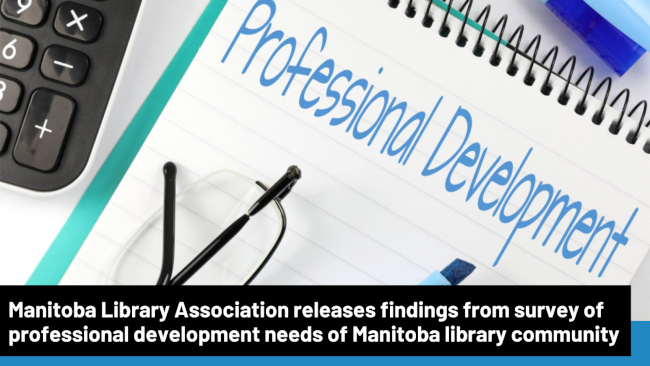
Manitoba Library Association (MLA) releases findings from survey of professional development needs of Manitoba library community
October 27, 2024
Earlier this month, the Manitoba Library Association (MLA) released findings from a survey conducted in May 2024 to better understand the professional development needs of Manitoba’s library community.
The questionnaire was adopted from the British Columbia Library Association’s 2019 Professional Learning Assessment Project and tailored to the context of Manitoba. In total, 51 members of Manitoba’s library community responded to the questionnaire, which collected both qualitative and quantitative responses.
Professional Learning Assessment Project
2024 Professional Learning Assessment Project: Executive Summary
The Manitoba Library Association (MLA) conducted the 2024 Professional Learning Assessment Project to assess the professional development needs of Manitoba’s library community. The assessment was modeled after the British Columbia Library Association’s 2019 Professional Learning Assessment Project, with a customized questionnaire distributed via MLA’s communication channels. The survey received 51 responses, providing both quantitative data and qualitative insights, which were analyzed using Microsoft Power BI and NVivo software. The framework for the questionnaire was built around the American Library Association’s (ALA) Core Competencies of Librarianship, which served as a key reference for evaluating the skills and confidence levels of respondents.
Key Findings:
- Core Competencies: The assessment was structured around the nine core competencies defined by the ALA, which include Technological Knowledge and Skills, Management and Administration, Social Justice, and Research and Evidence-Based Practice, among others. Respondents were asked to rank these competencies in terms of importance and to self-assess their confidence levels in each area.
- Technological Knowledge and Skills and Management and Administration emerged as the top competencies needed to deliver effective library services, with many respondents expressing confidence in these areas.
- Social Justice, encompassing topics like Equity, Diversity & Inclusion (EDI), Truth & Reconciliation, and Accessibility, emerged as having a significant gap, ranking high in importance but showing low confidence, indicating a need for more focused professional development in this area.
- Competencies such as Research and Evidence-Based Practice and Reference and User Services also showed lower confidence levels, indicating potential areas for further training and development.
- Pressing Issues: Respondents identified Social Justice as the most pressing issue Manitoba libraries face today, with subtopics such as Truth & Reconciliation, Accessibility, and serving vulnerable populations frequently mentioned. Additionally, Management and Administration, particularly in small libraries, was highlighted as a significant challenge, with respondents expressing the need for more training in strategic planning, conflict resolution, and succession planning. Concerns around funding and advocacy were also prominent, particularly with regard to securing resources for training and maintaining relevance in a rapidly changing environment.
- Preferred Learning Methods: Respondents expressed a preference for online classes offered through professional associations, in-person conferences, and workshops as the most effective formats for professional development. However, time constraints, budget limitations, and geographic distance—especially for those in rural areas—were cited as barriers to accessing these opportunities. Online learning was particularly appealing due to the flexibility it offers, but many respondents also valued the networking and collaboration opportunities presented by in-person events.
- Work Fulfillment and Motivations: Respondents indicated that a sense of support from colleagues and management, meaningfulness in their work, and ongoing opportunities for education were key factors contributing to job fulfillment. Many cited their passion for libraries and a desire to positively impact their communities as motivations for pursuing a career in librarianship. The opportunity to help patrons, especially vulnerable populations, and make a tangible difference in people’s lives was a recurring theme.
- Role of the MLA: The MLA was viewed as instrumental in addressing professional development needs, with respondents calling for the organization to facilitate more inperson training events, conferences, and networking opportunities. The return of inperson conferences was highly desired, as these events are seen as essential for both learning and building professional connections. Additionally, respondents suggested that the MLA take a more active role in advocating for the profession, particularly in terms of securing better funding and promoting the value of libraries to the broader community.
Conclusions:
The findings of this study underscore the importance of targeted professional development in Social Justice and Management, where confidence gaps are most significant. As libraries continue to face challenges such as funding shortages and evolving community needs, it is essential that professional learning opportunities are accessible and affordable, particularly for those in rural areas. The MLA is well-positioned to lead these efforts by organizing both online and in-person learning events, advocating for the profession, and helping Manitoba’s library workers stay connected and well-equipped to meet current and future challenges.
(Via Manitoba Library Association)
Professional development by Nick Youngson CC BY-SA 3.0 Pix4free
Add a new comment